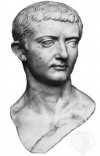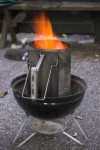Definition: (noun) A style that involves indirect ways of expressing things.
Synonyms: circumlocution, periphrasis.
Usage: His head was swimming when the lecture finally ended, and he felt the speaker's ambages had taken him everywhere and left him nowhere.
Discuss
Source: The Free Dictionary
 In 1992, a tenant farmer in the village of Hoxne, England, lost a hammer and asked a friend for help finding it with a metal detector. While searching the field, the friend discovered silver utensils, gold jewelry, and numerous gold and silver coins. Archaeologists notified of the find excavated the site the next day and found what has become known as the Hoxne Hoard—the largest hoard of late Roman silver and gold discovered in Britain. What objects are among its treasures?
In 1992, a tenant farmer in the village of Hoxne, England, lost a hammer and asked a friend for help finding it with a metal detector. While searching the field, the friend discovered silver utensils, gold jewelry, and numerous gold and silver coins. Archaeologists notified of the find excavated the site the next day and found what has become known as the Hoxne Hoard—the largest hoard of late Roman silver and gold discovered in Britain. What objects are among its treasures?  The Roman leader Flaminius is thought to have instituted the Plebeian Games in 220 BCE. They originally may have been held in the
The Roman leader Flaminius is thought to have instituted the Plebeian Games in 220 BCE. They originally may have been held in the  Tiberius was the second Roman emperor. The stepson of the first Roman emperor, Augustus, he undertook his first military command at age 22 and earned great acclaim. Forced to give up his beloved wife to marry Augustus’s daughter, he went into a self-imposed exile until he was recalled by Augustus and named his heir. As emperor, he initially ran the state efficiently and instituted reforms, but he became increasingly brutal. Who smothered Tiberius while he was recovering from an illness in 37 CE?
Tiberius was the second Roman emperor. The stepson of the first Roman emperor, Augustus, he undertook his first military command at age 22 and earned great acclaim. Forced to give up his beloved wife to marry Augustus’s daughter, he went into a self-imposed exile until he was recalled by Augustus and named his heir. As emperor, he initially ran the state efficiently and instituted reforms, but he became increasingly brutal. Who smothered Tiberius while he was recovering from an illness in 37 CE?  The word barbecue can refer to many things: a specific cooking method, cooking apparatus, type of food, or party that includes such food. For many, the word brings to mind smoky meats flavored with a variety of sauces, rubs, and seasonings. However, the origins of both the word and activity are somewhat obscure. Most etymologists believe it was derived from the term “barbacoa,” which means “sacred fire pit” in the language of the Taíno people of the Caribbean. What are some other explanations?
The word barbecue can refer to many things: a specific cooking method, cooking apparatus, type of food, or party that includes such food. For many, the word brings to mind smoky meats flavored with a variety of sauces, rubs, and seasonings. However, the origins of both the word and activity are somewhat obscure. Most etymologists believe it was derived from the term “barbacoa,” which means “sacred fire pit” in the language of the Taíno people of the Caribbean. What are some other explanations?  The construction of the Jefferson Memorial on the Tidal Basin in Washington, DC, was authorized by Congress in 1934. In 1939, US President Franklin Roosevelt presided over a ceremony during which the cornerstone of the monument was laid. Completed and dedicated in 1943, the white marble building, designed by John Russell Pope, is a circular structure with a domed ceiling, surrounded by 26 columns. Inside is a bronze statue of Jefferson. Why was a temporary plaster statue initially erected there?
The construction of the Jefferson Memorial on the Tidal Basin in Washington, DC, was authorized by Congress in 1934. In 1939, US President Franklin Roosevelt presided over a ceremony during which the cornerstone of the monument was laid. Completed and dedicated in 1943, the white marble building, designed by John Russell Pope, is a circular structure with a domed ceiling, surrounded by 26 columns. Inside is a bronze statue of Jefferson. Why was a temporary plaster statue initially erected there?  Each of the
Each of the